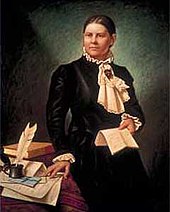Lucy Stone
Lucy Stone (born August 13, 1818 in West Brookfield , Massachusetts , † October 18, 1893 in Dorchester , a district of Boston ) was an American reformer , suffragette , abolitionist and publicist . As the first American wife, she kept her maiden name.
Life
Lucy Stone was the third daughter of nine children of the farmer Francis Stone and his wife Hannah Matthews. The upbringing of the children was closely monitored by their parents. Lucy was considered precocious and extremely intelligent. She was one of the first women to study theology at Oberlin College , Ohio , against the wishes of her parents and the college administration. There she met Antoinette Brown (1825–1921), who was seven years her junior , and with whom she soon became a close friend. The two women first fought against the rule that women in the courses were only allowed to listen and not speak.

In 1856, suffragettes Lucy Stone and Antoinette Brown became sisters-in-law, having married brothers Henry and Samuel Blackwell within a year . Their sisters were the first American doctors Elizabeth and Emily Blackwell . The marriage, which all reports said was a happy one, had a daughter, Alice (1857–1950). Lucy Stone caused controversy because after she got married, she kept her maiden name as a symbol of the woman's right to individuality. Those women who followed suit were called "Lucy Stoners ."
During the Civil War , “Mrs. Stone "for the " Women's National Loyal League " . In 1866 she helped found the American Equal Rights Association and a year later she was elected president of the New Jersey Women Suffrage Association . In 1868 she helped set up the New England Women Suffrage Association ; the following year she and her family moved to Boston. Together with other women Lucy Stone founded in November 1866 " American Woman's Suffrage Association " (AWSA). In addition to her commitment to women's rights, she also vehemently advocated the abolition of slavery .
While other suffragettes temporarily supported Victoria Woodhull in her presidential candidacy in 1872, she consistently turned against Woodhull and expressed her disgust.
In 1870, “Mrs. Stone, "the Woman's Journal , the premier newspaper of the American women's movement, with the help of her husband, Henry Blackwell (1825-1909). She was the editor of this newspaper until her death.
Lucy Stone League
In May 1921 Ruth Hale founded the women's organization Lucy Stone League , whose goal was, among other things, that women can keep their maiden name after marriage. Among the co-founders were Jane Grant , wife of Harold Ross , and Beatrice Kaufman , wife of the playwright George Simon Kaufman . Other members were Neysa McMein , Janet Flanner , Franklin Pierce Adams , Solita Solano , Anita Loos , Fannie Hurst and Blanche Oelrichs .
“ How do I benefit from being able to choose, owning property, etc., if I cannot freely dispose of my body and its functions? "
literature
- Leslie Wheeler: Loving Warriors: Selected Letters of Lucy Stone and Henry B. Blackwell, 1853 to 1893. 1981.
- Carol Lasser and Marlene Deahl Merrill: Friends and Sisters: Letters between Lucy Stone and Antoinette Brown Blackwell, 1846-1893. University of Illinois Press 1987, ISBN 0-252-01396-4 .
- Andrea Moore Kerr: Lucy Stone: Speaking Out for Equality. Rutgers University Press, New Brunswick 1992, ISBN 978-0-8135-1860-2 .
- Victor Grossman : Rebel Girls: Portraits of 34 American Women , Cologne: Papyrossa, 2012, pp. 83–86.
- Sally G. McMillen: Lucy Stone. To Analpologetic Live. Abstract. Oxford University Press, Oxford New York 2015.
- Hendrikje Schauer, Marcel Lepper : Brontë, Douglass, Marx and Stone. Parallel lives. Berlin / Weimar 2018, ISBN 978-3-9819406-0-2 (with chronology, register).
Web links
- Literature by and about Lucy Stone in the catalog of the German National Library
- Biography, literature & sources on Lucy Stone FemBio of the Institute for Women's Biography Research
- American National Biography - Lucy Stone (Engl.)
- Lucy Stone Ohio History Central
- National Women's Hall of Fame (Engl.)
- The Liberator Files (English).
- Lucy Stone in the database of Find a Grave (English)
Individual evidence
- ^ Sally G. McMillen: Lucy Stone. To Analpologetic Live. Extract online. Oxford University Press, Oxford New York 2015, pp. 200, 202.
| personal data | |
|---|---|
| SURNAME | Stone, Lucy |
| BRIEF DESCRIPTION | American suffragette and abolitionist |
| DATE OF BIRTH | August 13, 1818 |
| PLACE OF BIRTH | West Brookfield , Massachusetts |
| DATE OF DEATH | October 18, 1893 |
| Place of death | Dorchester , a borough of Boston |




